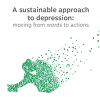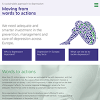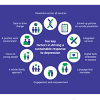What we’ve achieved
Recognising the urgent need for policymakers to effectively address depression, nine key mental health-related organisations joined forces to produce a report to offer recommendations based on existing examples of good practice. HPP was invited to support this work. The report, A sustainable approach to depression: moving from words to actions, features ten policy recommendations which constitute a framework for action to provide a sustained policy response to depression. Sixteen case studies are also included, along with a checklist for future projects based on the lessons learnt.
The report was launched at the European Parliament on 5 December 2018, at a meeting of the European Parliament Interest Group on Mental Health, Well-being and Brain Disorders, co-organised by the initiators of the report. Supported by some 13 MEPs, the meeting was chaired by Tomas Zdechovsky MEP and Julian Beezhold (European Psychiatric Association).
In 2019, we supported GAMIAN-Europe, one of the nine organisations that co-authored the report, to set up a dedicated Words to Actions website. Throughout 2019, we produced several spin-off publications based on the original report, starting with a four-page policy ask. We also created a series of policy briefs, which were accompanied by blog posts co-authored with different mental health organisations.
In 2020, the initiative continued with the launch of a dedicated Twitter account, managed by HPP. We produced an animation based on the initial policy report, which we launched on World Mental Health Day in October. We also created a series of posters highlighting key topics in depression, each of which was promoted by a mini campaign on Twitter.
The project continued with the development of an assessment framework for depression, which was applied to several countries in Europe to produce national-level depression scorecards.





